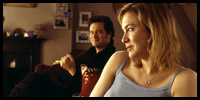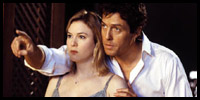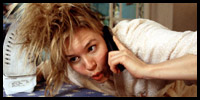
 |
|
Bridget Jones: The Edge of Reason (2004) Cast: Renee Zellweger, Colin Firth, Hugh Grant, Gemma Jones, Jim Broadbent, Jacinda Barrett, Sally Phillips, Shirley Henderson, James Callis, Lucy Robinson, Jessica Stevenson, Paul Nicholls, James Faulkner 2004 – 108 minutes Rated: Reviewed by Dustin Putman, November 11, 2004.  2001's "Bridget Jones's Diary" was a charmer of a movie, a thoughtful and sweet romantic comedy with a heroine who was lovable precisely because she was imperfect—her habits included swearing, smoking, and drinking, she was naturally a little clumsy, and irresistible Renee Zellweger had a few extra pounds that separated her from modern-day's onslaught of rail-thin Hollywood actresses. As the picture ended, Bridget Jones (Renee Zellweger) had won over the noble Mark Darcy (Colin Firth) and taken a critical step in being more comfortable in her own body, backed up by the sincerity in her new beau's words to her: "I love you just as you are." It wasn't a new message in the world of cinema—that of accepting yourself and those around you no matter the differences—but it was carried out with a heartwarming substantiality lacking in many similar thematic films.
2001's "Bridget Jones's Diary" was a charmer of a movie, a thoughtful and sweet romantic comedy with a heroine who was lovable precisely because she was imperfect—her habits included swearing, smoking, and drinking, she was naturally a little clumsy, and irresistible Renee Zellweger had a few extra pounds that separated her from modern-day's onslaught of rail-thin Hollywood actresses. As the picture ended, Bridget Jones (Renee Zellweger) had won over the noble Mark Darcy (Colin Firth) and taken a critical step in being more comfortable in her own body, backed up by the sincerity in her new beau's words to her: "I love you just as you are." It wasn't a new message in the world of cinema—that of accepting yourself and those around you no matter the differences—but it was carried out with a heartwarming substantiality lacking in many similar thematic films.
 Directed by Beeban Kidron (1995's "To Wong Foo, Thanks for Everything, Julie Newmar"), "Bridget Jones: The Edge of Reason" may be based on the follow-up novel by Helen Fielding, but that doesn't make it any less unnecessary. Essentially, this is the same film as "Bridget Jones's Diary," a slapdash rehash that concocts a number of inferior variations on scenes from its predecessor and takes our perpetually perky, put-upon heroine through a remarkably similar plot trajectory. What was once fresh and genuine, however, now feels strained and downright desperate.
Directed by Beeban Kidron (1995's "To Wong Foo, Thanks for Everything, Julie Newmar"), "Bridget Jones: The Edge of Reason" may be based on the follow-up novel by Helen Fielding, but that doesn't make it any less unnecessary. Essentially, this is the same film as "Bridget Jones's Diary," a slapdash rehash that concocts a number of inferior variations on scenes from its predecessor and takes our perpetually perky, put-upon heroine through a remarkably similar plot trajectory. What was once fresh and genuine, however, now feels strained and downright desperate.
 In reality, three-and-a-half years have passed since Bridget Jones and Mark Darcy finally shared their feelings for each other on that snowy London street, but in the film world it has only been six weeks. All is well for our happy singleton-no-more until she starts gathering suspicions that Mark may be cheating on her with his overly friendly colleague, Rebecca (Jacinda Barrett). When further incriminating evidence comes into view—a foregone misunderstanding and a flimsy excuse to create conflict—Bridget's relationship with Mark suddenly goes kaput. Fate suddenly steps into Bridget's life when she is once again reunited with seductive, smarmy Daniel Cleaver (Hugh Grant) to do a journalistic piece in Thailand. Despite an uncertainty in whether to trust Daniel again, a potentially blossoming but wrongheaded romance between them forces Bridget to reassess the conclusions she jumped to in breaking up with Mark and the love she still holds for him.
In reality, three-and-a-half years have passed since Bridget Jones and Mark Darcy finally shared their feelings for each other on that snowy London street, but in the film world it has only been six weeks. All is well for our happy singleton-no-more until she starts gathering suspicions that Mark may be cheating on her with his overly friendly colleague, Rebecca (Jacinda Barrett). When further incriminating evidence comes into view—a foregone misunderstanding and a flimsy excuse to create conflict—Bridget's relationship with Mark suddenly goes kaput. Fate suddenly steps into Bridget's life when she is once again reunited with seductive, smarmy Daniel Cleaver (Hugh Grant) to do a journalistic piece in Thailand. Despite an uncertainty in whether to trust Daniel again, a potentially blossoming but wrongheaded romance between them forces Bridget to reassess the conclusions she jumped to in breaking up with Mark and the love she still holds for him.
 With four writers lending a hand in the screenplay—Andrew Davies, Richard Curtis, Adam Brooks, and novelist Helen Fielding herself—and none of them capable of taking Bridget Jones and her life in different and new places, it is all the more obvious that "Bridget Jones: The Edge of Reason" never should have been made. The original film stood on its own as a satisfying and complete whole; revisiting the characters and having them do the same things with no further personal growth and only a fraction of the charisma cheapens what has come before. This is one sequel where a pressing need to find out what happened to the protagonist is absent, replaced, instead, by an attempt to cash in on the financial success of the first picture.
With four writers lending a hand in the screenplay—Andrew Davies, Richard Curtis, Adam Brooks, and novelist Helen Fielding herself—and none of them capable of taking Bridget Jones and her life in different and new places, it is all the more obvious that "Bridget Jones: The Edge of Reason" never should have been made. The original film stood on its own as a satisfying and complete whole; revisiting the characters and having them do the same things with no further personal growth and only a fraction of the charisma cheapens what has come before. This is one sequel where a pressing need to find out what happened to the protagonist is absent, replaced, instead, by an attempt to cash in on the financial success of the first picture.
 Notably disquieting is in the treatment of Bridget Jones herself. In its precursor, she felt like a real, flawed, flesh-and-blood human being, a sympathetic 32-year-old woman whose occasional klutziness and discomfort in social situations were endearing character traits. In "The Edge of Reason," Bridget is too often viewed in a mean-spirited light, her naturally clumsy persona treated like pathetic buffoonery. The first film laughed with Bridget; this one makes the dire mistake of laughing at her, which, coincidentally, stifles the humor. A few choice moments remain, none more so than an outrageous stint on the ski slops that left me tearing up with laughter, but, by and large, the set-pieces are more tedious than funny. An elongated stop at a Bangkok prison when Bridget is caught unknowingly carrying cocaine in her bag is just plain bizarre, sure proof that the material is being stretched thin.
Notably disquieting is in the treatment of Bridget Jones herself. In its precursor, she felt like a real, flawed, flesh-and-blood human being, a sympathetic 32-year-old woman whose occasional klutziness and discomfort in social situations were endearing character traits. In "The Edge of Reason," Bridget is too often viewed in a mean-spirited light, her naturally clumsy persona treated like pathetic buffoonery. The first film laughed with Bridget; this one makes the dire mistake of laughing at her, which, coincidentally, stifles the humor. A few choice moments remain, none more so than an outrageous stint on the ski slops that left me tearing up with laughter, but, by and large, the set-pieces are more tedious than funny. An elongated stop at a Bangkok prison when Bridget is caught unknowingly carrying cocaine in her bag is just plain bizarre, sure proof that the material is being stretched thin.
 Renee Zellweger (2003's "Down with Love") fits back into the role and English accent of Bridget Jones with ease, a comedic performance with heart, but even she can't stop her part from being more of a caricature this time around. Her chemistry with Colin Firth (2003's "Love, Actually"), once palpable and winning, is non-existent here. Mark Darcy mediates between oafishness and aloofness, not helped by a performance from Firth that is hopelessly bland. Oddly enough, Zellweger shares more sparks with Hugh Grant (2002's "Two Weeks Notice") in their fleeting scenes together, but their energetic interplay is for nothing; Grant's Daniel Cleaver was, and still is, an unsavory womanizer. As Bridget's parents, Gemma Jones (2002's "Harry Potter and the Chamber of Secrets") and Jim Broadbent (2004's "Vanity Fair") have seen their turns reduced to glorified cameos. Finally, the talented Jacinda Barrett (2004's "Ladder 49") brings a touch of humanity to Rebecca in her final scene, her character arc a delightful twist on what is expected of her.
Renee Zellweger (2003's "Down with Love") fits back into the role and English accent of Bridget Jones with ease, a comedic performance with heart, but even she can't stop her part from being more of a caricature this time around. Her chemistry with Colin Firth (2003's "Love, Actually"), once palpable and winning, is non-existent here. Mark Darcy mediates between oafishness and aloofness, not helped by a performance from Firth that is hopelessly bland. Oddly enough, Zellweger shares more sparks with Hugh Grant (2002's "Two Weeks Notice") in their fleeting scenes together, but their energetic interplay is for nothing; Grant's Daniel Cleaver was, and still is, an unsavory womanizer. As Bridget's parents, Gemma Jones (2002's "Harry Potter and the Chamber of Secrets") and Jim Broadbent (2004's "Vanity Fair") have seen their turns reduced to glorified cameos. Finally, the talented Jacinda Barrett (2004's "Ladder 49") brings a touch of humanity to Rebecca in her final scene, her character arc a delightful twist on what is expected of her.
"Bridget Jones: The Edge of Reason" treads the same ground as "Bridget Jones's Diary"—the opening Christmas party Bridget attends at her family's home; the misadventures she has working as a news reporter; the insecurities she has about herself and her relationships; her gossipy get-togethers with pals Shazzer (Sally Phillips), Tom (James Callis), and Jude (Shirley Henderson); and even the childish climactic fight between Mark and Daniel—but there is little joy in it and a glaring deficiency of details. There is also a carelessness in the way director Beeban Kidron is willing to take the plot of "Bridget Jones's Diary" and not even attempt to put a fresh spin on it.  What is nearly missing altogether is the one element that should have been more strongly carried over from the original: Bridget's diary. The diary was a way to get inside the mind of Bridget to see and hear and feel what she was thinking, but it only appears a handful of times, and then only as afterthoughts. "Bridget Jones's Diary" welcomed you into her quirkily fetching life and psyche, and got you to care about her ultimate happiness. "Bridget Jones: The Edge of Reason" distances the viewer from her, all the while making a mockery out of her lovably offbeat qualities. The filmmakers, actors, and studio would have been wise to leave well-enough alone, but then they wouldn't have gotten those all-important hefty paychecks.
What is nearly missing altogether is the one element that should have been more strongly carried over from the original: Bridget's diary. The diary was a way to get inside the mind of Bridget to see and hear and feel what she was thinking, but it only appears a handful of times, and then only as afterthoughts. "Bridget Jones's Diary" welcomed you into her quirkily fetching life and psyche, and got you to care about her ultimate happiness. "Bridget Jones: The Edge of Reason" distances the viewer from her, all the while making a mockery out of her lovably offbeat qualities. The filmmakers, actors, and studio would have been wise to leave well-enough alone, but then they wouldn't have gotten those all-important hefty paychecks.
|
© 2004 by Dustin Putman |














